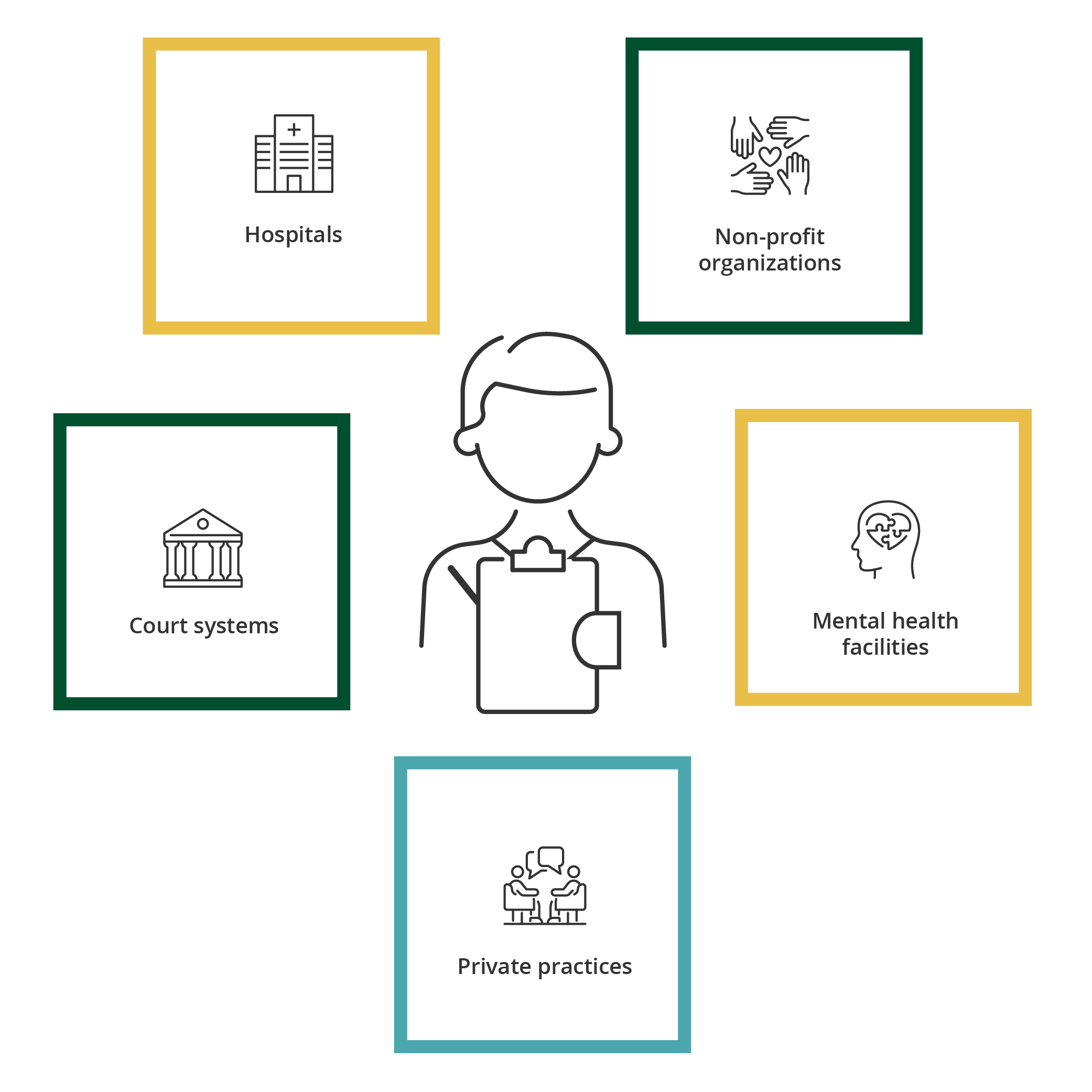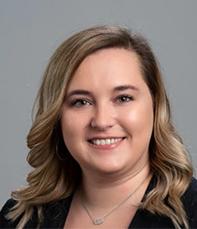Online MA in Counseling Psychology – Forensic Track
The MACP Forensic Track is designed to prepare students for impactful counseling careers, working specifically with offenders or victims in the justice system. This specialized track offers in-depth coursework on forensic assessment, criminal behavior, PTSD studies, and more, providing a comprehensive understanding of how the legal system intersects with forensic counseling.
Students will be equipped to pursue licensure and excel in roles such as correctional counselors. The program also covers essential topics in counseling and forensic services, ensuring graduates have the skills needed to thrive in various settings, including victim services, correctional facilities, juvenile detention centers, probation and parole agencies, social service organizations, and beyond
-
The online MACP–Forensic program allows you to launch your counseling career in just over two years (full-time)—while connecting you with a supportive community rooted in shared values.
- 60 credit hours
- 100 practicum hours and 600+ internship hours
- Seven semesters (full-time), Ten semesters (part-time)
- Three intakes per year (Spring, Summer, Fall)
- MPCAC Aligned
-
-
-
-
-
The online MACP–Forensic program allows you to launch your counseling career in just over two years (full-time)—while connecting you with a supportive community rooted in shared values.
- 60 credit hours
- 100 practicum hours and 600+ internship hours
- Seven semesters (full-time), Ten semesters (part-time)
- Three intakes per year (Spring, Summer, Fall)
- MPCAC Aligned
Transform Lives. Fight for Justice.
This course will introduce students to the legal system, including the relationship between law and the mental health system. This course will cover the role of mental health counselors in the legal system and explores topics such as the ethical issues regarding assessment screening, mental health testimony, competency to stand trial, the insanity defense, and child custody disputes. Also, this course will focus on ethical, legal and professional dilemma, and decision making models to address these dilemmas. The relationships among children and family services, juvenile justice, and correctional services are presented. Multicultural contexts and diversity are central elements in this course.
(3 credits)
The course will introduce students to major theories of criminal and aggressive behavior, including the historical context of criminal behavior. Behavioral, social learning, cognitive, psychoanalytic, psychodynamic, developmental, biological and sociocultural perspectives are presented. Case examples are used to illustrate these various perspectives. Topics include mental disorders associated with offending, substance abuse and crime, sexual crimes, juvenile delinquency, women and crime, and victim/perpetrator rights.
(3 credits)
This course will introduce students to the role of the forensic evaluator as well as the forensic assessments that are typically used by mental health practitioners in the criminal justice system. Students will learn how to administer, score and interpret selected forensic assessment instruments. This includes risk assessment, competency, mental state at the time of offense, psychopathy and malingering. The course will include an introduction to when causes, assessment, classification and treatment of juvenile delinquency. Ethical issues are also addressed.
(3 credits)
This course explores the causes and effects of traumatic events. Although Posttraumatic Stress Disorder is typically thought of as trauma experienced as a result of combat, there is increasing recognition that traumatic events may occur at any age, from childhood through advanced adulthood and in many circumstances. The approach in this course will be, not only to obtain a clear understanding of the disorder in all its manifestations, but also thorough exposure to a variety of readings, films, and guest lectures to encounter the various ways in which trauma is experienced, the ways in which intervention is possible, and the multiple modalities for treatment.
(3 credits)
Learn More
We’re here to answer any questions you may have about the program, including enrollment, tuition, admission requirements, curriculum details, and more.
Your Way to Success
Step one
Complete the form to get started
Enter your information and instantly access your digital program guide.
Step two
Speak with an advisor
An advisor will reach out to you, or you can schedule a call at a time that is right for you.
Step three
Submit your application
Gather the information you need and get started on your application.
Step four
Get started on your MACP degree
Confirm your admittance and earn your online MACP degree in as few as 2.3 years.
Where Do Counselors Work?
With a master's degree in counseling psychology, you may practice in a variety of settings including hospitals, non-profit organizations, mental health facilities, private practices, court systems and more.
Frequently Asked Questions
Licensed Forensic Counselors make an average of $87,877 per year
Source: https://www.ziprecruiter.com/Salaries/Forensic-Counselor-Salary
Licensed Forensic Counselors practice in diverse environments, including victim services, correctional facilities, juvenile detention centers, probation and parole agencies, social service agencies, and more.
Felician University’s online Master of Arts in Counseling Psychology curriculum is aligned with the Masters in Psychology and Counseling Accreditation Council (MPCAC). Felician University is accredited by the Middle States Commission on Higher Education.
Our focus is on preparing students to be compassionate, community-focused, and facilitative of the potential of others, while striving to maintain the ideas of the Gospel and following the model of St. Francis through service to others. In the realm of counseling, a new paradigm – positive psychology – has emerged during the last 10 years. An emphasis on mindfulness, spiritual development, and empowering the potential of others has become a new and core theoretical expansion of models of counseling that we incorporate into our curriculum.
This program requires 60 credit hours of coursework with 100 practicum hours and 600+ internship hours. The program can be completed part-time in 10 semesters (3.3 years) or full-time in 7 semesters (2.3 years).
The online Master of Arts Counseling Psychology program costs $925.00 per credit hour for a total degree cost of $55,500, excluding fees. A discount is available to Felician University alumni. A 30% EdAssist discount may also be available to those who work for a qualifying employer. Visit our tuition page to learn more.








